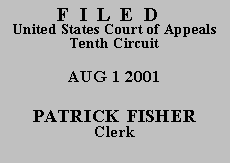

| ARTHUR JOHNEL ALLOWAY, |
|
| v. | |
| WACKENHUT CORRECTIONAL
FACILITY, d/b/a Lawton Correctional
Facility; DAYTON J. POPPELL,
Warden; DR. MARK FOGEL;
SANDRA ATWOOD; SECURITY
MAJOR; CORRECTIONS
CORPORATION OF AMERICA;
GARLAND JEFFERS, Warden;
FRANK PRICE, Classification
Supervisor; LANITA DAVIS, Case
Manager; MR. HUTCHERSON,
Contract Monitor for ODOC and CCA;
DR. ZAHID AHMAD; DR. TAMMY
KASTE, Physicians Supervisor for
CCA Facilities; KENNETH STEIN,
Physicians Assistant; PHYLLIS
HANSEN, Health Services Supervisor;
Defendants-Appellees. |
Arthur Johnel Alloway, a state inmate proceeding pro se and in forma pauperis, appeals the district court's decision dismissing his complaint brought pursuant to 42 U.S.C. § 1983, and various federal and state laws. The magistrate judge, in a thorough twenty-eight page report and recommendation, determined that each of Mr. Alloway's claims lacked merit and recommended granting the defendants' motion for summary judgment. After reviewing the record de novo, the district court adopted the report and recommendation in its entirety. For the reasons stated below, we affirm.
I.
In his complaint, Mr. Alloway alleged that (1) the defendants provided him inadequate medical treatment at both the Lawton Correctional Facility ("LCF") and at the Diamondback Correctional Facility ("DCF"); (2) the defendants denied him access to visitors and family at DCF; (3) the defendants denied him access to the courts at DCF; (4) the defendants were negligent in their classification and transfer of him to DCF; and (5) the defendants placed him on grievance restriction at DCF as a form of retaliation and harassment. On appeal, Mr. Alloway contests only the district court's grant of summary judgment with respect to his claim of inadequate medical treatment. We review the grant of summary judgment de novo. See Anderson v. Coors Brewing Co., 181 F.3d 1171, 1175 (10th Cir. 1999). Though we construe a pro se litigant's pleadings liberally, we will not supply additional factual allegations to round out the pleadings. See Whitney v. New Mexico, 113 F.3d 1170, 1173-74 (10th Cir. 1997).
II.
The magistrate judge determined that Mr. Alloway's claim that he received inadequate medical care was insufficient as a matter of law because he failed to show any deliberate indifference on the part of the defendants. To survive summary judgment, a claim under the Eighth Amendment must show both that the state action has denied the plaintiff the minimal civilized measure of life's necessities and that the state actors have shown deliberate indifference to the plaintiff's needs. See Wilson v. Seiter, 501 U.S. 294, 297-98 (1991). Furthermore, when a prisoner does in fact receive medical care, he has no Eighth Amendment claim based merely on his disagreement with the nature of the diagnosis. See Ledoux v. Davies, 961 F.2d 1536, 1537 (10th Cir. 1992). The record is clear that Mr. Alloway's medical conditions were monitored, that any adverse reactions were treated, and that he received examinations and medications or other treatment in response to his symptoms. At most, Mr. Alloway's claims amount to a difference of opinion or medical negligence.
We have carefully reviewed the record on appeal, as well as the briefs submitted by the parties. Applying the standards set out above, we affirm the judgment for substantially the same reasons stated in the magistrate judge's October 31, 2000 report and recommendation and the district court's December 7, 2000 order adopting the recommendation. The judgment of the district court is AFFIRMED.
Entered for the Court,
Robert H. Henry
Circuit Judge
*. This order and judgment is not binding precedent, except under the doctrines of law of the case, res judicata, and collateral estoppel. The court generally disfavors the citation of orders and judgments; nevertheless, an order and judgment may be cited under the terms and conditions of 10th Cir. R. 36.3.